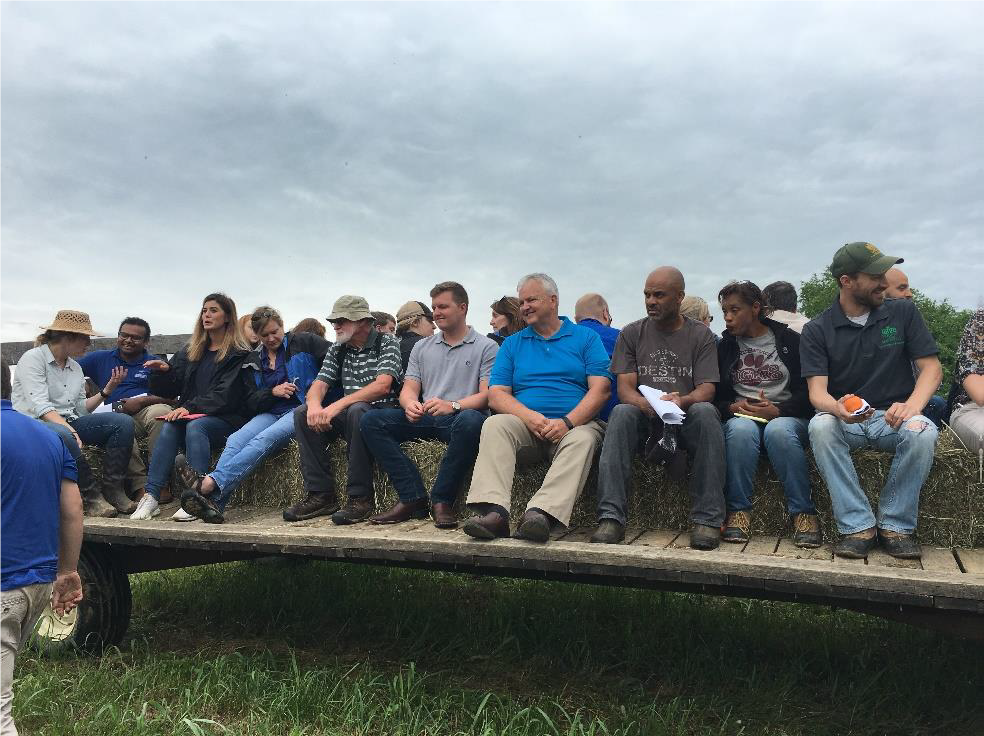By Cindy Finneseth, PhD, with support from Allison Kaika, National Farmers Union Intern
As a part of the Local Food Safety Collaborative (LFSC)’s work on produce safety outreach to farmers, education and training, Kentucky Horticulture Council (KHC) and its partners have put together a project to teach Kentucky’s produce farmers about requirements for testing agricultural water samples. KHC, led by Cindy Finneseth, PhD, is a non-profit coalition of horticulture industry professional member organizations, including several producer groups. This blog shares some of the important and exciting work KHC has been able to perform so far!
More than 75% of Kentucky’s farms are less than 180 acres, and more than 2,100 of those small-scale family farms grow produce for fresh market sales. The number of produce growers continues to increase. While no large-scale incident has been observed locally, there has been an increase nationally in the frequency of food-borne illnesses linked to fresh produce. A key component of the Produce Safety Rule (PSR) of the Food Safety Modernization Act (FSMA) is the microbial quality of water that is likely to come into contact with produce or food contact surfaces during production and post-harvest activities.
To ensure compliance with FSMA, produce farmers will be required to assess their water quality. Furthermore, water quality testing is required for any producer applying for Good Agricultural Practices (GAPs) certification, which is important to access many wholesale markets. The ability for Kentucky produce farmers to obtain GAPs certification is hindered without the opportunity to secure reliable water analyses and access to laboratory testing.
To address these issues, LFSC has partnered with KHC to provide efficient and accurate testing of agricultural water samples for Kentucky’s produce growers with food safety education about laboratory analysis. Agriculture water with a risk of microbial contamination include surface (lakes, ponds, and streams) and ground (wells) water sources used during crop production and for post-harvest handling.
In collaboration with their partners, on May 30, 2019, KHC facilitated an Agricultural Water Field Day at Angel Farms in Winchester, Kentucky. This farm is a large-scale operation, growing several different crops and using surface water as an irrigation source. Despite it being a busy time for growers and threatening weather predicted, more than 30 people attended the field day, including growers, technical service providers, and governmental agencies.

The day began with a welcome by David Davis, the local County Extension Agent for Agriculture and Natural Resources, and Cindy Finneseth, Executive Director of KHC. Dr. Paul Vijayakumar from the University of Kentucky Food Systems Innovation Center (UK FSIC) kicked off the learning session by reviewing FSMA and agricultural water regulations. Next, Ben Conner with the Kentucky Department of Agriculture explained FDA’s on-farm monitoring program with distribution of several educational resources.
Following the welcome, participants rode out to kale production fields for a sampling demonstration and discussion of sample results by KHC’s Paul Dengel and Cindy Finneseth. They presented strategies to combat high microbial counts, including a discussion of management techniques which led to a demonstration of physical (UV filters) and chemical (chlorinating) systems by Badri Vengarai Jagannathan, from the University of Kentucky FSIC, and Bob McNiel, Highland Moor, a distributor of the Accu-Tab System, respectively.
The monitoring and detection of coliforms, specifically E. coli, in agricultural water is an important issue for Kentucky produce growers. Understanding how to correctly sample and combat harmful bacteria will ensure the safe production of produce crops, as well as prepare growers for food safety inspections and audits.
The day concluded with a discussion led by Bryan Brady, University of Kentucky’s Cultivate Kentucky Program about farm water quality plans for those producers who were seeking Good Agriculture Practices (GAPs) certification through third part audits. Technical resources available to growers and potential funding resources for food safety upgrades were also highlighted. In the end, the survey results from the Field Day were extremely positive, with 100% of the respondents indicating they learned new information about water quality and produce safety.
Another event – a twilight tour – a was held on June 11, 2019, by the University of Kentucky Christian County Cooperative Extension Service including KHC in Fairview, Kentucky. The Fairview Produce Auction is a large, regional facility in southwestern Kentucky that has been operating since 1997, where local farmers can sell a wide range of specialty crops.

Approximately 140 people – including many Amish growers – attended the event. A field tour covered sprayer calibration, followed by a tomato grading demonstration, a pesticide discussion, and presentation on agricultural water sampling and FSMA compliance. Several growers were familiar with the requirements under FSMA, but many were not. The one-on-one consultations improved their understanding of when and how to sample their water sources as well as what to do if their water has microbial presence that exceeds the allowable standards.
These two events, along with many more, have been the result of the partnership LFSC has formed with KHC through their subaward. This work is made possible by funding from the U.S. Food and Drug Administration. Understanding how to test your agricultural water, interpret results, and develop strategies to remediate issues is an essential component to producing safe food. Thankfully, through KHC and their collaborators, more produce farmers in Kentucky are able to access the resources and knowledge they need to be successful to produce safe, nutritious food and succeed in a competitive market.
If you are a grower in Kentucky, stay on the lookout for upcoming events with Kentucky Horticulture Council and their collaborators here. Follow KHC on Twitter @KYHorticulture or on Facebook @KYHortCouncil.


